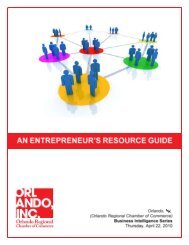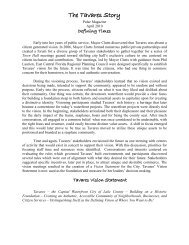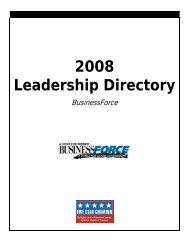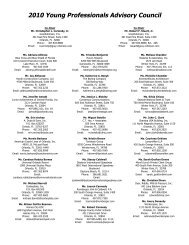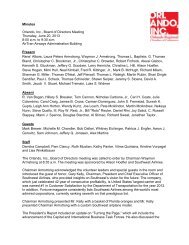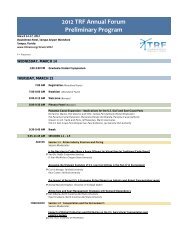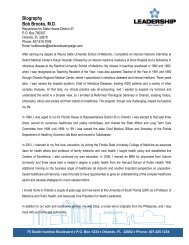FM Oct 04 PDF - Orlando Chamber of Commerce
FM Oct 04 PDF - Orlando Chamber of Commerce
FM Oct 04 PDF - Orlando Chamber of Commerce
You also want an ePaper? Increase the reach of your titles
YUMPU automatically turns print PDFs into web optimized ePapers that Google loves.
Because labor and employment laws are so complex, FirstMonday is presenting a<br />
series <strong>of</strong> articles by local attorneys to help <strong>Chamber</strong> Members identify labor issues<br />
and avoid possible pitfalls.<br />
Stop, Look and Listen<br />
Important wage and hour laws implemented.<br />
By Theresa M. Gallion, Esq., Fisher & Phillips LLP<br />
On Aug. 23, 20<strong>04</strong>, the U.S.<br />
Labor Department’s new regulations<br />
defining the Fair Labor Standards<br />
Act’s executive, administrative,<br />
pr<strong>of</strong>essional, and outside-sales<br />
exemptions went into effect. The<br />
“white collar” exemption status <strong>of</strong><br />
employees will now be controlled<br />
by those revised rules.<br />
The battle over these exemptions<br />
is not over, and employers<br />
will want to stay abreast <strong>of</strong> what<br />
could be increasingly fast-breaking<br />
developments so that they can<br />
make their views known to senators<br />
and representatives in a timely way;<br />
proponents <strong>of</strong> the modifications<br />
can certainly be expected to do so.<br />
Any employers who haven’t<br />
already evaluated where they stand<br />
should move ahead with compliance<br />
efforts immediately. Among the best<br />
first steps are:<br />
1. Ensure that you have detailed,<br />
accurate, up-to-date information<br />
about what your exempt or<br />
potentially-exempt employees’<br />
job duties actually are<br />
2. Evaluate whether similar<br />
exemptions from the overtime laws<br />
<strong>of</strong> other jurisdictions in which you<br />
employ people will or will not be<br />
affected by these changes<br />
3. Look into whether your other pay<br />
practices are in compliance with all<br />
applicable wage and hour laws.<br />
General Observations<br />
The new regulations bumped the<br />
minimum exemption pay threshold<br />
for the executive, administrative,<br />
and pr<strong>of</strong>essional exemptions to<br />
$455 per week.<br />
The threshold “total annual<br />
compensation” triggering the new<br />
exemption for “highly compensated<br />
employees” is at $100,000. In order to<br />
be an exempt, highly compensated<br />
employee, a person must also receive<br />
a salary or fee basis <strong>of</strong> at least $455<br />
per week, and their total annual<br />
compensation must be at least<br />
$100,000. These persons must also<br />
perform work that is conducted in<br />
an <strong>of</strong>fice or is otherwise non-manual.<br />
The new rules do<br />
contain explicit statements<br />
that these exemptions<br />
do not apply to various<br />
manual laborers or other<br />
“blue collar” workers “no<br />
matter how highly paid<br />
they might be.”<br />
The new regulations<br />
also expressly state that<br />
they do not apply to police <strong>of</strong>ficers,<br />
fire fighters, other law-enforcement<br />
personnel, rescue workers, EMTs,<br />
paramedics, and similarly situated<br />
persons “regardless <strong>of</strong> rank or<br />
pay level.”<br />
Revised Exemptions<br />
The executive exemption has<br />
been modified to require a new<br />
level <strong>of</strong> authority, specifically the<br />
authority to hire or fire, or to be an<br />
individual whose suggestions and<br />
recommendations as to hiring,<br />
firing, advancement, promotion,<br />
or any other change <strong>of</strong> employee<br />
status is given particular weight.<br />
The key change with respect to<br />
the administrative exemption is that<br />
the work <strong>of</strong> persons properly exempt<br />
under this classification must include<br />
the exercise <strong>of</strong> discretion and independent<br />
judgment with respect to<br />
matters <strong>of</strong> significance. It’s expected<br />
that the Department <strong>of</strong> Labor<br />
will take steps to ensure that the<br />
administrative employee exemption<br />
is not over-used.<br />
The primary duty test for<br />
administrative is unchanged, except<br />
that the term “management” is<br />
now “management policies.” Many<br />
observers feel this is an effort to<br />
broaden the administrative exemption,<br />
such that the primary duty is<br />
now being engaged in <strong>of</strong>fice or<br />
non-manual work, directly related to<br />
the management polices or general<br />
business operations <strong>of</strong> the employer<br />
or the employer’s customers.<br />
Several changes were made<br />
in the description <strong>of</strong> pr<strong>of</strong>essional<br />
employees. The intent <strong>of</strong> the<br />
Department <strong>of</strong> Labor is to ensure<br />
that true pr<strong>of</strong>essionals perform work<br />
that is predominately intellectual<br />
Theresa M. Gallion<br />
and which must include<br />
the consistent exercise <strong>of</strong><br />
discretion and judgment.<br />
This could also include<br />
work requiring invention,<br />
imagination, originality,<br />
or talent in a recognized<br />
field <strong>of</strong> artistic or<br />
creative endeavor.<br />
Pr<strong>of</strong>essional employees<br />
continue to include persons who<br />
perform work requiring knowledge<br />
<strong>of</strong> an advanced type in a field <strong>of</strong><br />
science or learning customarily<br />
acquired by a prolonged course <strong>of</strong><br />
specialized intellectual instruction.<br />
Other Key Changes<br />
One new rule allows for unpaid<br />
disciplinary suspensions <strong>of</strong> one or<br />
more full days “imposed in good<br />
faith for infractions <strong>of</strong> workplace<br />
conduct rules,” but only if imposed<br />
“pursuant to a written policy<br />
applicable to all employees.” It’s<br />
anticipated that an example <strong>of</strong> this<br />
policy is unpaid suspensions for<br />
violating a sexual harassment policy<br />
or a workplace violence policy.<br />
As most employers know,<br />
exemptions are also dependent<br />
upon being paid on a “salary basis.”<br />
Improper deductions that threaten<br />
the salary basis can also threaten<br />
the exemption. To avoid situations<br />
where the salary basis is adversely<br />
affected, perhaps unintentionally,<br />
the new regulations create a<br />
“safe harbor” if there is a clearly<br />
communicated policy prohibiting<br />
improper pay deductions including<br />
a complaint mechanism, employees<br />
are reimbursed when mistakes<br />
are discovered, and the employer<br />
makes a good-faith commitment<br />
to comply with the salary basis<br />
rules in the future.<br />
Only time will tell the impact <strong>of</strong><br />
the new wage and hour regulations.<br />
Cautious employers in Central<br />
Florida should stop long enough to<br />
evaluate the impact <strong>of</strong> these regulations<br />
on their business practices.<br />
For more, contact Theresa Gallion<br />
at 407-541-0876.<br />
<strong>FM</strong> OCTOBER 20<strong>04</strong> 11



